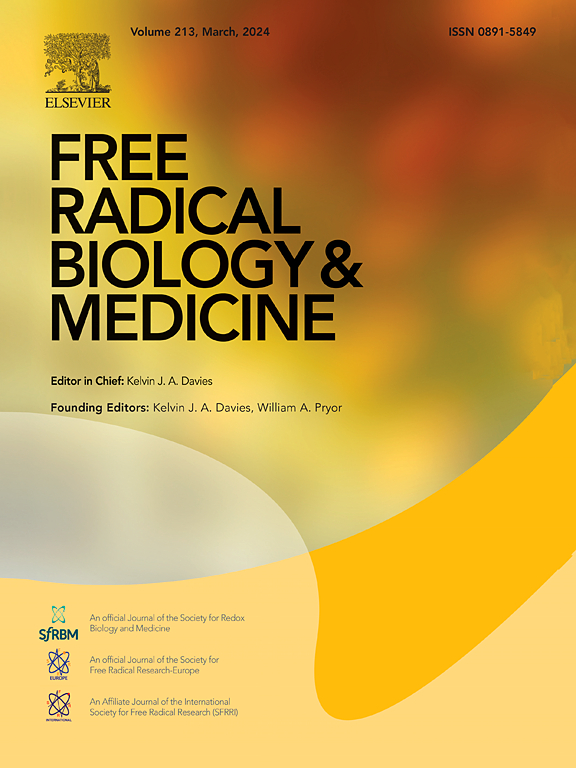Indole lactic acid derived from Akkermansia muciniphila activates the aryl hydrocarbon receptor to inhibit ferroptosis in ischemic stroke
IF 7.1
2区 生物学
Q1 BIOCHEMISTRY & MOLECULAR BIOLOGY
引用次数: 0
Abstract
Ischemic stroke concurrent with gut microbiome dysbiosis induces intestinal damage, which exacerbates cerebral infarction. Probiotic or prebiotic interventions that reverse gut microbiome dysbiosis can promote recovery after ischemic stroke. Akkermansia muciniphila (AKK) safeguards intestinal health and is a promising probiotic; however, its role in ischemic stroke remains unclear. In this study, we found that live AKK, but not pasteurized AKK, mitigated ischemic-stroke-induced neurological injury, reduced cerebral infarction, and enhanced both blood-brain and intestinal barrier integrity. Moreover, the AKK supernatant reduced intestinal and cerebral injury, demonstrating efficacy comparable to that of live AKK. Metabolomic analysis revealed that the AKK supernatant was significantly enriched in indole lactic acid (ILA), a tryptophan metabolite. ILA levels were elevated in the serum and brains of pseudo-germ-free stroke rats administered AKK. Exogenous gavage with ILA mitigated ischemic-stroke-induced brain and intestinal damage. Mechanistically, ILA activated the aryl hydrocarbon receptor (AhR) and the nuclear transcription factor Nrf2, leading to the upregulation of SLC7A11 and GPX4 protein expression. This attenuated lipid peroxidation and intracellular iron accumulation triggered by ischemic stroke. Notably, intervention with the AhR inhibitor CH223191 abrogated the protective effects of ILA in ischemic stroke rats. These findings suggest that the therapeutic efficacy of AKK in ischemic stroke is at least partially attributable to ILA-mediated ferroptosis inhibition via AhR activation. AKK was selectively enriched by Puerariae lobatae Radix-resistant starch (PRS), promoting ILA generation more effectively than inulin and β-glucan. AKK and PRS synergistically alleviated ischemic-stroke-induced impairments, outperforming monomicrobial or prebiotic treatment alone. These findings reveal the unique mechanisms of AKK in ischemic stroke and provide a viable strategy for the clinical treatment of ischemic stroke through a novel synbiotic combination.

从嗜粘杆菌中提取的吲哚乳酸激活芳烃受体,抑制缺血性卒中中的铁下垂
缺血性脑卒中并发肠道微生物群失调可引起肠道损伤,从而加重脑梗死。逆转肠道菌群失调的益生菌或益生元干预可以促进缺血性中风后的恢复。muciniphila (Akkermansia muciniphila, AKK)是一种具有肠道健康保护作用的益生菌;然而,其在缺血性中风中的作用尚不清楚。在这项研究中,我们发现活的AKK,而不是巴氏杀菌的AKK,可以减轻缺血性中风引起的神经损伤,减少脑梗死,并增强血脑和肠屏障的完整性。此外,AKK上清减少了肠道和脑损伤,显示出与活AKK相当的疗效。代谢组学分析显示,AKK上清液显著富含吲哚乳酸(ILA),一种色氨酸代谢物。服用AKK的伪无菌脑卒中大鼠血清和脑内ILA水平升高。外源性ILA灌胃可减轻缺血性脑卒中引起的脑和肠道损伤。从机制上讲,ILA激活了芳烃受体(AhR)和核转录因子Nrf2,导致SLC7A11和GPX4蛋白表达上调。这减弱了由缺血性中风引起的脂质过氧化和细胞内铁积累。值得注意的是,用AhR抑制剂CH223191干预可以消除ILA对缺血性脑卒中大鼠的保护作用。这些发现表明,AKK在缺血性卒中中的治疗效果至少部分归因于ila通过AhR激活介导的铁下垂抑制。与菊粉和β-葡聚糖相比,葛根抗根淀粉(PRS)选择性富集AKK,促进ILA生成的效果更好。AKK和PRS协同缓解缺血性卒中引起的损伤,优于单微生物或益生元单独治疗。这些发现揭示了AKK在缺血性脑卒中中的独特机制,并为临床治疗缺血性脑卒中提供了一种新的合成组合策略。
本文章由计算机程序翻译,如有差异,请以英文原文为准。
求助全文
约1分钟内获得全文
求助全文
来源期刊

Free Radical Biology and Medicine
医学-内分泌学与代谢
CiteScore
14.00
自引率
4.10%
发文量
850
审稿时长
22 days
期刊介绍:
Free Radical Biology and Medicine is a leading journal in the field of redox biology, which is the study of the role of reactive oxygen species (ROS) and other oxidizing agents in biological systems. The journal serves as a premier forum for publishing innovative and groundbreaking research that explores the redox biology of health and disease, covering a wide range of topics and disciplines. Free Radical Biology and Medicine also commissions Special Issues that highlight recent advances in both basic and clinical research, with a particular emphasis on the mechanisms underlying altered metabolism and redox signaling. These Special Issues aim to provide a focused platform for the latest research in the field, fostering collaboration and knowledge exchange among researchers and clinicians.
 求助内容:
求助内容: 应助结果提醒方式:
应助结果提醒方式:


